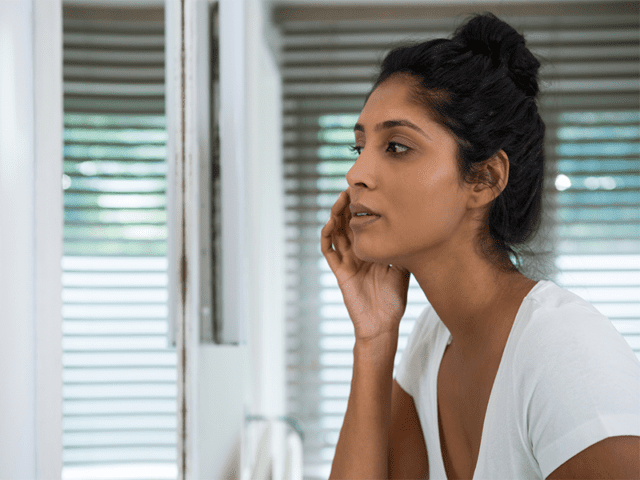Are you a ‘Popaholic’? An addictive yet unpleasant habit that’s been popular for a long time is pimple popping. From YouTube videos to Instagram, watching people pop their pimples has become trending content. But did you know that popping your own pimples can lead to infection and permanent scarring, and interfering could make them look even worse?
In conversation with TC46, Dermatologist Dr Kiran Godse of Hiranandani Hospital, Mumbai talks about the causes of adult acne, tips on treating pimples and some effective alternate solutions to pimple popping.
1. Is it okay to pop your pimples?
Pimple popping is when one tries to squeeze their pimples to get rid of them! And it shouldn’t be done because of its undesired after-effects. Ideally, it is not good to pop pimples, that isn’t the best way to get rid of them. By popping a pimple, one is extending the inflammation further deep down into the skin, increasing the chances of scarring.
2. What are some common causes of pimples?

Pimples can be caused by many reasons like:
- Seborrhea Oleosa (oily skin)
- Stress
- Hormonal imbalance
- Medications
- Over-hydration of skin
3. What is adult acne and why does it happen?
Adult acne is late onset acne occurring after the age of 25 years, and it occurs due to many reasons like medication, hormones and environmental factors like humidity.
4. Should you pop your own pimples? What are some techniques to do it safely?
Ideally, it is not good to pop pimples, it isn’t the best way to get rid of them. If one wants to get rid of a zit, one can use topical Benzoyl Peroxide or topical Salicylic Acid. Even if one does pop pimples, it is good to seal the wound with Hydrocolloid Patches or acne patches that are available in the market, because they help in better healing of the wound, keeping the wound covered, preventing further infection. These pimple patches even work well if one has a tendency to pick acne.
5. Should you consult a dermatologist before you pop your pimples? Should it be done by a doctor only?
Visiting a dermatologist is the best option because they can analyze your skin and do what’s best for you. Huge zits or Cystic Acne can be treated with Intralesional Steroids, but this is to be strictly done by a dermatologist.
6. What should you do after popping a pimple?
Even if one does pop pimples, it is good to seal the wound with Hydrocolloid Patches or acne patches that are available in the market, these help in better healing of the wound, and keeps the wound covered preventing further infection.
7. What are some side-effects of popping pimples? What are some alternative solutions to pimple popping?
Pimple popping can lead to:
- Secondary infection
- Scarring and pigmentation
Regular usage of prescription Retinoid under a dermatologists supervision is the best way to keep acne/pimples at bay. You can even try using curd on face as it helps treat acne in a natural way.
Key Takeaways For Pimples
- When it comes to acne, it is best to use topical medications prescribed by your dermatologist
- Those recommended by a friend or beauty esthetician from a salon might not help, and sometimes can worsen the lesions
- Pimple popping can lead to secondary infection, scarring and pigmentation, hence should be avoided
Pimple Popping Tricks & Tips
- Clean your skin, clean your fingers, and make sure that your nails are cut, since they harbour bacteria.
- Pre-clean and post-clean the area with good ol’ hydrogen peroxide, diluted with an equal quantity of water, to minimize the chance of infection and scarring.
- You can use two cotton-tipped applicators to gently squeeze the pimple.
- Also, you can dab a little salicylic acid to calm inflammation and dry the pimple.
- Dermatologists recommend first putting on a little Visine, it constricts blood vessels so it immediately brings down the redness, and then a dab on a tiny bit of cortisone cream to reduce inflammation, redness, and swelling.
- Glycolic acid that helps clear up post-inflammatory hyper-pigmentation quickly.
- A clay mask helps cleanse the skin and can be used once a week to prevent adult acne.

